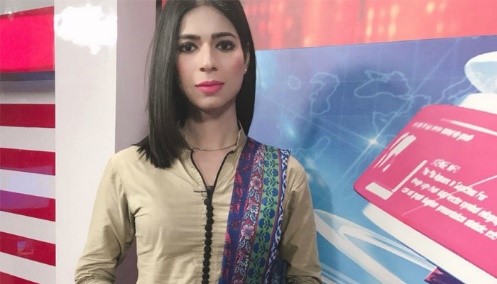The sex status of transgender people can vary depending on their circumstances and choices.
Every evening, when I enter the academy, where I teach, I see something unusual, close my eyes, and step up to avoid observing the insulting attitude against transgender begging.
Transgender people are those whose gender identity, expression, or behavior does not match the sex they were assigned at birth. According to a survey, public attitudes toward transgender people are broadly positive, but they vary depending on the situation and the characteristics of the respondents levels. Some of the issues that transgender people face in the public sphere are discrimination, harassment, violence, and lack of legal recognition. Transgender people also have diverse experiences and needs, depending on their circumstances and identities.
Sex status is a legal term that refers to the sex assigned to a person at birth, usually based on their external genitalia. Transgender is a term that describes a person whose gender identity does not match their assigned sex at birth1. Transgender people may or may not change their sex status through legal or medical procedures, depending on their personal preferences and the laws of their country.
Therefore, the sex status of transgender people can vary depending on their circumstances and choices. Some transgender people may have the same sex status as their gender identity, while others may have a different sex status. Some transgender people may not identify with either of the binary sexes (male or female), and may prefer a third or non-binary option.
Can a female be a transgender?
Yes, there are also female transgender. A female transgender is someone who was assigned male at birth but identifies and lives as a woman. Some female transgender may also use the term Trans-woman or MTF (male-to-female) to describe themselves.
Female transgender may or may not undergo medical interventions, such as hormone therapy or surgery, to align their body with their gender identity. This is a personal choice that depends on various factors, such as availability, affordability, safety, and preference.
Female transgender persons are a diverse group of people who have different experiences, backgrounds, and identities. They deserve respect and acceptance, just like anyone else.
Transgender Rights
Transgender rights are the rights of people who identify with a gender that is different from the one they were assigned at birth. Transgender rights include the right to express one’s gender identity without fear of discrimination, harassment, or violence. Access appropriate and affirming health care, education, and social services. Change one’s legal name and gender marker on official documents and participate fully and equally in society and public life.
Transgender rights are human rights, and they are based on the principles of dignity, equality, and freedom. However, transgender rights are not universally recognized or respected. Many countries have laws that criminalize or restrict transgender people’s gender expression, identity, or transition. Many transgender people also face social stigma, exclusion, and violence in their daily lives.
Therefore, transgender rights are also a matter of social justice and advocacy. Many transgender activists and allies work to raise awareness, challenge stereotypes, and demand legal and policy changes to protect and promote transgender rights.
Some examples of transgender rights movements and campaigns are the International Transgender Day of Visibility, celebrated on March 31 every year, celebrates transgender people and their contributions to society. The Transgender Day of Remembrance, observed on November 20 every year, to honor the memory of transgender people who have been killed by anti-transgender violence, the Transgender Legal Defense and Education Fund, a US-based organization that provides legal assistance and education to transgender people and their families. The Global Action for Trans Equality, is an international network of transgender organizations and activists that advocates for transgender rights at the regional and global levels.
Transgender rights are the rights of people who identify with a gender that is different from the one they were assigned at birth. In Pakistan, transgender rights have been legally recognized and protected by the Transgender Persons (Protection of Rights) Act, 201812. This law aims to allow transgender people to self-identify their gender and change their legal documents, accordingly, prohibit discrimination and harassment of transgender people in education, employment, health, and public places, provide safe houses, medical facilities, psychotherapy, and education to transgender people, establish a National Council for Transgender Persons to monitor and enforce the law.
However, despite this progressive legislation, transgender rights in Pakistan are still not fully respected or implemented. Many transgender people face social stigma, violence, poverty, and lack of access to basic services.
Some of the challenges and barriers that transgender people face in Pakistan are lack of awareness and acceptance of transgender identity among the general public and authorities, difficulty in obtaining identity cards, passports, and other documents that reflect their gender identity, exclusion from family, community, and religious institutions; Limited access to quality health care, especially for transition-related procedures. Harassment and abuse by police, security forces, and religious groups, forced involvement in begging, dancing, or sex work; Lack of legal protection and redress for human rights violations.

Therefore, transgender rights in Pakistan are still a matter of social justice and advocacy. Many transgender activists and allies work to raise awareness, challenge stereotypes, and demand legal and policy changes to protect and promote transgender rights.
Some examples of transgender rights movements and campaigns in Pakistan are the Khawaja Sira Society, a community-based organization that provides support, education, and advocacy for transgender people. The Trans-Action Alliance, a network of transgender activists and groups that campaigns for transgender rights and empowerment.
The Aks International Minorities Festival, a film and arts festival that showcases the stories and talents of transgender and other marginalized communities The Blue Veins, a non-governmental organization that works on gender, health, and human rights issues, especially for transgender people.
Right of vote by Transgender in Pakistan
Transgender individuals in Pakistan have been granted the right to vote and identify their gender on national identity cards since 2012. However, in May 2023, the Federal Shariat Court (FSC) cancelled some sections of the Transgender Persons (Protection of Rights) Act 2018 and stopped implementing the Transgender Persons (Protection of Rights) Rules, 202, which challenged this right. This verdict was met with protests and lawsuits from the transgender community and human rights activists. In September 2023, the National Database and Registration Authority (Nadra) resumed registering transgender people for national IDs, which allowed them to vote in the upcoming general elections in January 2024. Despite this, the current status of transgender voting rights in Pakistan remains uncertain and contested, as the FSC verdict is still pending review by the Supreme Court
"Published under International Cooperation with "Sindh Courier"

Comments